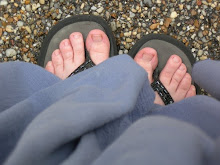 keep a candle in the window
keep a candle in the windowkeep a fire on your hearth
keep a prayer on your lips and
keep some hope in your heart
~ Vigilantes of Love
But in general, God doesn't just turn up when you page Him. He is right where He always is, and what regular, daily-maybe-twice prayer gives us is some more hint of just where that is, and how to get there, and one of the things liturgy gives us is a way to get there when all our other ways have given out.
~ Lauren Winner
From Madeline L’Engle’s Walking on Water:
For most of us a watch is accurate enough so that we know when to get up, to go to work, to go to church, to meet a friend. But even though we now have a moderately consistent chronology according to our clocks, there is considerable variation in our interior clocks. How long is a tooth-ache? How long is a wonderful time? Lewis Carroll expressed a profound truth when he had the Mad Hatter say, “If you knew time as well as I do, you wouldn’t be talking about wasting it. It’s him… We quarreled last March… and ever since that… he won’t do a thing I ask.”
Lewis Carroll was a story-teller, an artist as well as a mathematician, and artists often have a more profound sense of what time iall about than do the scientists. There’s a story of a small village (about the size of the village near Crosswicks) where lived an old clockmaker and repairer. When anything was wrong with any of the clocks or watches in the village, he was able to fix them, to get them working properly again. When he died, leaving no children and no apprentice, there was no one left in the village who could fix clocks. Soon various clocks and watches began to break down. Those which continued to run often lost or gained time, so they were of little use. A clock might strike midnight at three in the afternoon. So many of the villagers abandoned their time-pieces.
One day a renowned clock-maker and repairer came through the village, and the people crowded around him and begged him to fix their broken clocks and watches. He spent many hours looking at all the faulty time pieces, and at last he announced that he could repair only those whose owners had kept them wound, because they were the only ones which would be able to remember how to keep time.
So we must daily keep things wound: that is, we must pray when prayer seems dry as dust; we must write when we are physically tired, when our hearts are heavy, when our bodies are in pain.
We may not always be able to make our “clock” run correctly, but at least we can keep it wound, so that it will not forget.

No comments:
Post a Comment